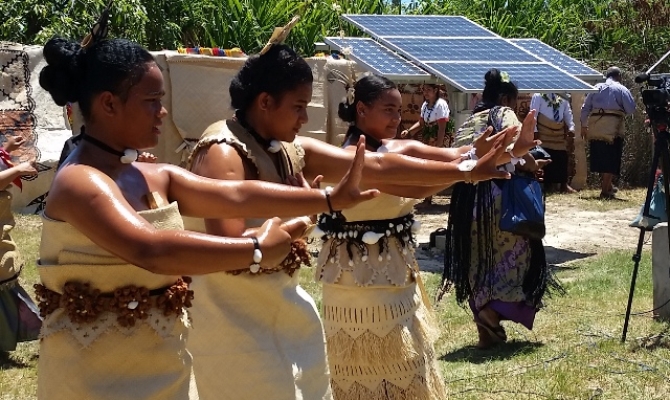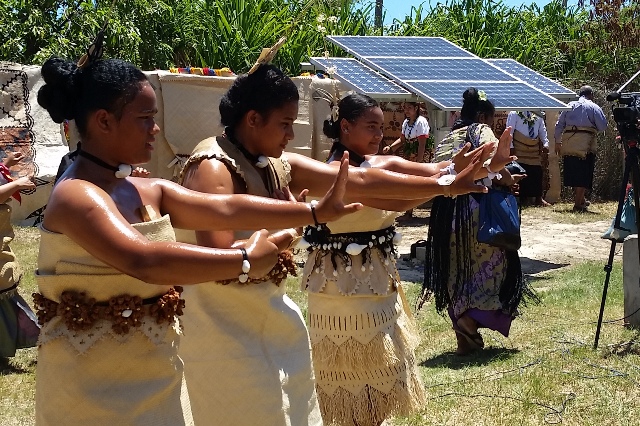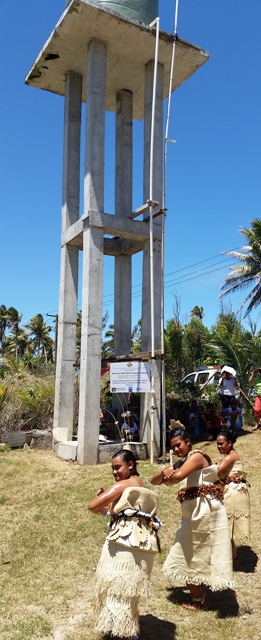
Climate Change Resilience
Thirteen remote villages in the Ha’apai District of Tonga now have improved access to water thanks to the installation of solar powered water pumps which help to reduce reliance on diesel fuel for access to well water.
Since the pumps which were launched for use in December last year, the fuel and electricity use in these 13 villages is estimated to have been reduced by more than half.
 Cultural performances during the official commissions of the solar powered water pumps in Tonga in December
Cultural performances during the official commissions of the solar powered water pumps in Tonga in December
Photo courtesy of PIGGAREP Tonga
“Switching to solar can result in a multitude of benefits, two of the most important being money-saving and the decrease in environmental impacts,” stated the head of the Tonga’s Energy Program, Dr. Tevita Tukunga during the official commissioning of the systems.
This project was funded by Denmark through an initiative called SIDS DOCK that aims to connect the energy sector in small island developing states with the global market for finance and sustainable energy technologies. It was implemented through PIGGAREP+ the Pacific Islands Greenhouse Gas Abatement through Renewable Energy Project.
PIGGAREP is funded by the Global Environment Facility (GEF), SIDS Dock support programme and Denmark, it is implemented by the United Nations Development Programme (UNDP) in Samoa and executed by the Secretariat of the Pacific Regional Environment Programme (SPREP).
Now the 13 villages have switched to solar pumps they have saved fuel already. For back-up the diesel based engines remain on standby for cloudy days.

“I am looking forward to communities in the Ha'apai islands being able to access safe water supplies utilising environmentally friendly technologies,” said Mr. Ofa Sefana, PIGGAREP project manager.
“This project has changed life within the villages by reducing the reliance on diesel fuels, which had to be transported to the island group. The project has also created job opportunities for local community members.”
As part of this project, 65 people were trained in operating the pumps and the Geology Department of Tonga is also monitoring the water to ensure its quality, all of which will help ensure the longevity of this important initiative.
This is just one initiative under PIGGAREP which works in 14 Pacific countries with the aim of removing barriers to renewable energy technologies to help reduce emissions from fossil fuel use in the Pacific region.
“SPREP is pleased to be part of an overall partnership working together to bring about positive impacts for our Pacific island countries and territories,” said Dr. Netatua Pelesikoti, Director of the Climate Change Division of SPREP.
“These changes brought about for our island communities is part and parcel of our work. We congratulate Tonga on seeing their hard work come to fruition and look forward to many more similar outcomes ahead for our region.”
The villages that have the new solar powered water pumps are Muitoa, Ha’ano, Pukotala, Fakakakai, Faleloa, Ha’ateihosi’i, Lotofoa, Fotua, Fangale’ounga, Koulo, Holopeka, Uiha and Felemea in the Ha’apai district.
For more information on PIGGAREP please contact Naheed Hussein at SPREP on [email protected].
Since the pumps which were launched for use in December last year, the fuel and electricity use in these 13 villages is estimated to have been reduced by more than half.
 Cultural performances during the official commissions of the solar powered water pumps in Tonga in December
Cultural performances during the official commissions of the solar powered water pumps in Tonga in DecemberPhoto courtesy of PIGGAREP Tonga
This project was funded by Denmark through an initiative called SIDS DOCK that aims to connect the energy sector in small island developing states with the global market for finance and sustainable energy technologies. It was implemented through PIGGAREP+ the Pacific Islands Greenhouse Gas Abatement through Renewable Energy Project.
PIGGAREP is funded by the Global Environment Facility (GEF), SIDS Dock support programme and Denmark, it is implemented by the United Nations Development Programme (UNDP) in Samoa and executed by the Secretariat of the Pacific Regional Environment Programme (SPREP).
Most remote villages in Tonga especially in the outer islands are very much dependent on underground water. Around 80% of the pumps in the Ha’apai group are diesel powered, 11% are powered by electricity and 9% powered by solar, excluding those that were recently commissioned under PIGGAREP Plus
Now the 13 villages have switched to solar pumps they have saved fuel already. For back-up the diesel based engines remain on standby for cloudy days.

“I am looking forward to communities in the Ha'apai islands being able to access safe water supplies utilising environmentally friendly technologies,” said Mr. Ofa Sefana, PIGGAREP project manager.
“This project has changed life within the villages by reducing the reliance on diesel fuels, which had to be transported to the island group. The project has also created job opportunities for local community members.”
As part of this project, 65 people were trained in operating the pumps and the Geology Department of Tonga is also monitoring the water to ensure its quality, all of which will help ensure the longevity of this important initiative.
This is just one initiative under PIGGAREP which works in 14 Pacific countries with the aim of removing barriers to renewable energy technologies to help reduce emissions from fossil fuel use in the Pacific region.
“SPREP is pleased to be part of an overall partnership working together to bring about positive impacts for our Pacific island countries and territories,” said Dr. Netatua Pelesikoti, Director of the Climate Change Division of SPREP.
“These changes brought about for our island communities is part and parcel of our work. We congratulate Tonga on seeing their hard work come to fruition and look forward to many more similar outcomes ahead for our region.”
The villages that have the new solar powered water pumps are Muitoa, Ha’ano, Pukotala, Fakakakai, Faleloa, Ha’ateihosi’i, Lotofoa, Fotua, Fangale’ounga, Koulo, Holopeka, Uiha and Felemea in the Ha’apai district.
For more information on PIGGAREP please contact Naheed Hussein at SPREP on [email protected].